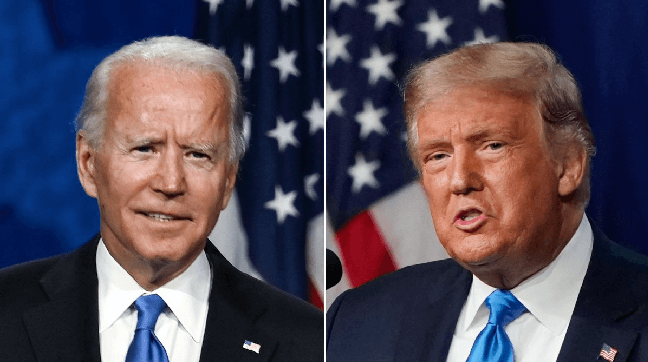With US Presidential Elections 2020 round the corner and presidential nominee, Joeseph Biden expanding his lead over Donald Trump, Indian and Jewish diaspora in the US have urged their governments to tread carefully and not outrightly favour any of the candidates.
Erdogan Claims Jerusalem; Has Turkey Replaced Iran As The Biggest Threat To Israel & The Arab World?
Although both communities are highly polarized, with a majority of them supporting Democrats, the incumbent governments in India and Israel have been rooting for the return of Donald Trump to the White House for another term.

In turn, Trump has also used pictures in the company of prime ministers of India and Israel, Narendra Modi and Benjamin Netanyahu, to woo large sections of the Indian and Jewish communities.
Head of the US-India Security Council Ramesh Kapur has asked Modi to see the trend and not put all the eggs in one basket. There is a similar message to Netanyahu from the powerful American Jewish Committee, one of its officer bearers told Anadolu Agency.
“During the last election, they [the Indian government] had put all stakes in Hillary Clinton. And then it took time to catch up with the Trump administration. They are doing it again,“ said Kapur, while interacting with the members of New Delhi-based Foreign Correspondents Club of South Asia.
Explaining the unpredictability of the 2020 elections, Chemi Shaler, a Washington-based senior columnist of Israeli newspaper Haaretz, said that unlike 2016, Biden has twice as big an average lead as Hillary Clinton had in 2016.
“If voting is held today, Biden would certainly win. But we are dealing with Donald Trump, who can pack decades of events into single hours. I would say Biden is on course to win, but that course could still include many obstacles,” he told a selected online audience in an event organized by Haaretz.
Small numbers but big influence
In terms of numbers, both the communities are minuscule, but their wealth and permeation in the establishment and the traditional power bastions like Ivy League universities, premier think-tanks, the judicial system, and, most notably in politics has made them an essential commodity for the presidential nominees.
According to the 2019 American Jewish Year Book, the number of Jews is estimated at 6.97 million, which makes them just 2% of the US population. The Indian diaspora is much fewer in numbers, just 4.4 million in the overall 331 million population of the country, according to the US Census American Survey.
Although among other Asian diaspora communities, Chinese stand at 5 million, Philippines 4 million, Pakistanis 544,000, and Bangladeshis 185,000, they appear less significant in the electoral scene in terms of better organization and influence in the system. Among the immigrants, Indians have shown the highest growth — 38% in 2011-2017.
With less than a month to go, when the US will vote on Nov. 3, and the gaps between the candidates unpredictable, both parties are trying to woo voters from every community to win the race for the White House.
According to Mukesh Aghi, the CEO of the US-India Strategic Partnership Forum, the Indian community may be small in numbers, but their near-total participation in the electoral process makes them important for the candidates. He said the Indian immigrant vote has also gone up by 147% since 2000.
Quoting a survey, Aghi said that in the US elections, the voting share of a group is directly proportional to its income and education. In the last presidential election, 78% of people with annual incomes of $150,000 or more came out to vote, while among those with a $10,000 annual income, just 41% took pains to walk to polling booths to participate in electoral exercise. “So, more income and better education mean more interest in the political system and voting,” he added.
Less interest in India-US relations
While Trump’s acceptability has increased among Indians from 22% in the previous election to 28% this year, the second generation of his community is less enthusiastic about the US policy towards India, according to Aghi.
“They tend to focus on domestic issues like other Americans,” he said, implying that their voting preference will be no different from others. He said the health crises due to the COVID-19 pandemic are having impacts on the minds of voters.
Aghi further said that Indian-Americans have been the largest contributors in the electoral funding in terms of per capita. They have contributed more than $3 million to the 2020 presidential campaigns so far. Noted Indian American industrialist Shalabh “Shalli” Kumar had donated a whopping $898,800 for the campaign of Trump in 2016.
Making a comparison of policies of two candidates vis a vis India, Kapur said Biden’s policy will be more multilateral and he expects India to play a pivotal role in the Quad partnership including Japan, US, and Australia to counter China.
He said Trump’s policy so far has been transactional based on charisma. Both Indian diaspora leaders, however, said New Delhi should not expect any concession on the issue of H1B visas, which allow US employers to employ foreign workers in specialty occupations, as it was linked to American jobs.
Biden traditional support for India
While the Indian establishment has been concerned at Biden’s recent statements about India’s new citizenship law that is discriminating against Muslims as well as his opposition to revoking the special status of Jammu and Kashmir, Kapur, who heads the US-India Security Council, reminds that India had narrowly escaped sanctions following 1975 nuclear tests because of Biden’s vote in the Senate.
The resolution was defeated in the House by just one vote. Also, while the former Republican President George Bush had signed the Indo-US nuclear deal, it was approved by the US Congress, only due to the active support of Democrat Biden in 2008.
Indian diaspora leaders are expecting the new administration to clear the Export Control Act, to allow India to be included in the proposed NATO plus five alliance. This proposed arrangement includes Japan, South Korea, Israel, Australia, and New Zealand. “We are trying our best to prevail in Washington to make India its sixth member,” said Kapur.
Israeli wish list
Israeli diaspora, on the other hand, wants Biden to help Jewish country’s normalization process with its Arab neighbours. “But these [Arab] countries will also be watching very closely what Biden does on Iran, and that will determine if he enjoys their support,” said senior Israeli journalist Shaler.
Jews surrounding “Trump-like” US Ambassador to Israel David Friedman — who professed that Israel is their top priority — are not representative of the wider American Jewish community, according to Shaler.
Allison Keplan Sommer, another senior Israeli journalist, said Trump’s refusal to condemn white supremacists has hit his popularity among Jews.
“I think it hurts his cause, and if anyone cares about the Jewish vote, they would know that there are voters who might otherwise be convinced to support him based on his relationship with Israel. But they hear these things and it makes it impossible for them to support him,“ Kaplan Sommer said.




